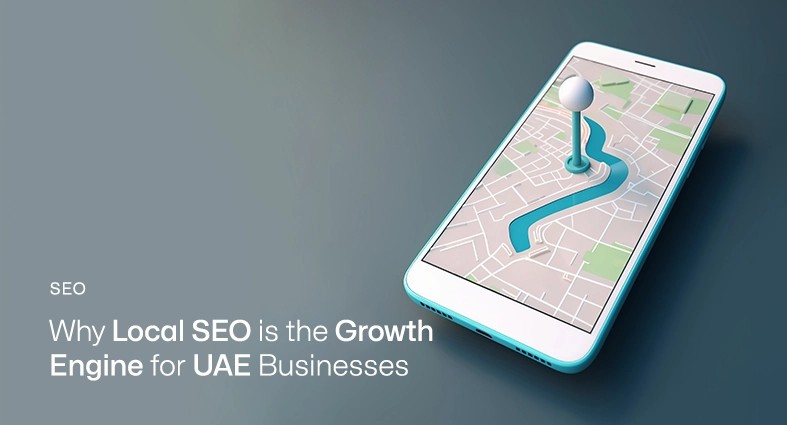As the digital landscape continues to evolve, mobile devices have become the primary means of accessing the internet for users in Abu Dhabi and beyond. In this mobile-centric era, having a responsive website has become more crucial than ever for businesses looking to thrive in the online realm. Responsive web design is a design approach that ensures websites can seamlessly adapt and respond to different screen sizes and resolutions across devices. It allows websites to provide an optimal user experience, regardless of whether visitors access the site on a desktop computer, laptop, smartphone, or tablet. A responsive design ensures that your website adapts seamlessly to different screen sizes and devices, providing an optimal browsing experience for users on smartphones, tablets, and desktops alike. The significance of responsive web design in Abu Dhabi’s mobile-first landscape cannot be overstated. With a significant portion of the population relying heavily on mobile devices for browsing and online activities, businesses must prioritize the development of mobile-friendly websites. By implementing responsive design, businesses can ensure their websites are accessible and visually appealing across all devices, delivering a consistent and user-friendly experience. In this article, we will explore the importance of responsive design in Abu Dhabi’s mobile-first world and provide valuable insights and tips on how to create a mobile-friendly website that drives success in this rapidly changing digital environment.
Benefits of Responsive Web Design
Responsive web design brings numerous advantages to businesses operating in Abu Dhabi’s mobile-first world. By ensuring a seamless and optimized user experience across all devices, the responsive design enhances engagement and customer satisfaction. It enables businesses to cater to the growing number of mobile users in Abu Dhabi, expanding their reach and visibility. Responsive design also positively impacts search engine optimization (SEO), improving mobile search rankings and driving organic traffic. Key elements such as flexible layouts, responsive images, and mobile-friendly navigation contribute to an outstanding user experience on any device. Investing in responsive web design is crucial for businesses in Abu Dhabi to stay competitive and succeed in the mobile-first landscape, as it delivers improved user experiences, broader reach, better SEO performance, and increased customer engagement and satisfaction.
Enhanced User Experience
One of the key advantages of responsive web design is its ability to provide a seamless and optimized user experience across all devices. Regardless of whether a visitor is accessing the website from a desktop computer, smartphone, or tablet, responsive design ensures that the content and layout adapt fluidly to fit the screen size and resolution. By implementing responsive design principles, businesses can improve user engagement and satisfaction. Users can easily navigate through the website, read content, and interact with various elements without having to zoom in or scroll horizontally. The website’s responsive nature creates a user-friendly environment, enhancing their overall experience and increasing the likelihood of them staying on the site longer.
Mobile-Friendly Approach
With the proliferation of mobile devices and the increasing number of mobile users, businesses must adopt a mobile-friendly approach to web design. By catering to the browsing habits and preferences of mobile users, a mobile-friendly website ensures that visitors can access and navigate the site effortlessly on their smartphones or tablets. Having a mobile-friendly website offers several advantages. It improves visibility and reach, as search engines favor mobile-friendly sites in mobile search results. With a mobile-friendly design, businesses can tap into a larger audience and capture the attention of potential customers who primarily use mobile devices for their online activities. A mobile-friendly approach also enhances the user experience for mobile visitors, boosting engagement and conversions.
Search Engine Optimization (SEO)
Responsive web design plays a crucial role in improving search engine optimization (SEO) efforts, particularly for mobile search rankings. Search engines, like Google, consider mobile-friendliness as a ranking factor for mobile search results. By having a responsive website, businesses increase their chances of ranking higher in mobile search, attracting more organic traffic and potential customers. In addition to improved rankings, having a single, responsive website simplifies SEO strategies. With separate desktop and mobile sites, businesses need to manage and optimize multiple versions, which can be time-consuming and resource-intensive. A responsive design eliminates the need for separate sites and ensures consistent content and SEO optimization across all devices. It streamlines SEO efforts, allowing businesses to focus on creating high-quality content, building backlinks, and implementing other SEO best practices.
Key Elements of Responsive Design
The key elements of responsive design encompass various components and strategies that ensure a website adapts and responds seamlessly to different devices and screen sizes. One of the crucial elements is flexible layouts and grid systems, where fluid grids are used to create a design that adjusts proportionally to fit different screen resolutions. Responsive images and media are also essential, as they need to be optimized and scaled appropriately to maintain quality and load quickly on all devices. Mobile-friendly navigation plays a significant role in responsive design, involving the use of intuitive and touch-friendly menus, collapsible sections, and other navigation elements that enhance the user experience on mobile devices. These key elements collectively contribute to a website’s ability to provide a consistent and visually appealing experience across devices, ensuring that users can access and navigate the content effectively regardless of the device they are using.
Flexible Layouts and Grid Systems
Flexible layouts and grid systems are essential components of responsive design. They enable websites to adapt seamlessly to different screen sizes, ensuring a consistent and visually appealing experience for users across devices. By using fluid grids, web designers can create layouts that automatically adjust and reflow based on the available screen real estate. With a flexible layout, elements on the webpage will dynamically resize and reposition themselves to fit the screen, whether it’s a large desktop monitor or a small mobile device. This approach allows content to be presented optimally, maximizing usability and readability. It eliminates the need for users to zoom in or scroll horizontally, enhancing their overall browsing experience.
Responsive Images and Media
Optimizing images and media is crucial for responsive design to maintain performance and visual quality across devices. With responsive images, designers ensure that images load quickly and efficiently on different screen sizes, preventing unnecessary bandwidth usage and reducing page load times. To achieve responsive images, techniques such as adaptive image resizing and compression can be employed. This means delivering images in different resolutions and sizes based on the user’s device capabilities, ensuring they look crisp and clear without wasting bandwidth or causing slow load times. Similarly, responsive media players allow for seamless playback of videos and other media content on various devices. These players automatically adjust their size and resolution to match the screen, ensuring optimal viewing experiences. By incorporating responsive media elements, web designers can create engaging and interactive experiences for users, regardless of the device they’re using.
Mobile-Friendly Navigation
Mobile-friendly navigation is a critical aspect of responsive design, as it directly impacts the user’s ability to navigate and interact with the website on smaller screens. Designing intuitive and user-friendly navigation menus for mobile users is essential to provide a smooth browsing experience. One common approach is the use of hamburger menus, which consist of a collapsible menu icon that expands into a full menu when clicked or tapped. Hamburger menus save screen space and allow users to access the navigation options without cluttering the interface. Additionally, collapsible sections and accordions can be implemented to hide or reveal additional content, minimizing scrolling and optimizing the use of screen real estate. Furthermore, touch-friendly navigation elements, such as larger buttons and easy-to-tap links, are crucial for mobile users. These elements make it easier for users to interact with the website using touch gestures and eliminate the frustration of accidentally tapping the wrong link or button.
Tips for Ensuring Responsiveness
This section provides valuable insights and practical tips for ensuring responsiveness in web design. Responsiveness refers to the ability of a website to adapt and display optimally on various devices, including desktops, smartphones, and tablets. The tips outlined here focus on achieving a consistent and seamless user experience across different screen sizes and resolutions. By adopting a mobile-first design approach, prioritizing testing and optimization, and optimizing performance, businesses can ensure their websites are responsive and user-friendly. Additionally, the section emphasizes the importance of partnering with professional web design agencies that specialize in responsive design to leverage their expertise and ensure customized solutions for businesses in Abu Dhabi. Implementing these tips will help businesses establish a strong online presence and effectively engage their target audience across devices.
Mobile-First Design Approach
Adopting a mobile-first design strategy is crucial for creating responsive websites that provide an optimal user experience across all devices. With the increasing dominance of mobile usage, it’s essential to prioritize mobile devices during the design process. By starting with mobile devices in mind, web designers can focus on simplifying the user interface, optimizing content layout, and prioritizing key elements for smaller screens. The benefits of adopting a mobile-first design approach are manifold. Firstly, it ensures that the website’s core functionalities and content are readily available on mobile devices, where space is limited. This approach encourages a more streamlined and focused design, eliminating any unnecessary clutter that could hinder mobile users’ navigation and engagement. A mobile-first design approach facilitates a responsive mindset from the start. As the design progresses to larger screens, designers can gradually enhance the layout, add additional elements, and make use of available screen real estate without compromising the mobile experience. This ensures a consistent and cohesive design across all devices.
Testing and Optimization
Thorough testing is a critical step in ensuring the responsiveness of a website. It involves evaluating how the website behaves across different devices, browsers, and screen sizes to identify any inconsistencies or usability issues. Testing helps uncover design flaws, layout inconsistencies, and functionality gaps that may hinder a seamless user experience. To effectively test responsiveness, designers and developers can utilize a combination of real devices, browser testing tools, and emulators. Real devices provide an accurate representation of how the website performs on specific mobile devices, while browser testing tools and emulators allow for simulating various device configurations without the need for physical devices. By thoroughly testing the website across multiple devices and screen sizes, potential issues can be identified and addressed promptly. This ensures that users can access and navigate the website seamlessly, regardless of the device they are using.
Performance Optimization
Optimizing website performance is vital for responsive design, particularly on mobile devices where users expect fast loading times and smooth interactions. Poor performance can lead to higher bounce rates and negatively impact the user experience. To enhance performance on mobile devices, several optimization techniques can be employed. One essential aspect is optimizing images by compressing them without sacrificing quality. By reducing image file sizes, loading times can be significantly improved. Minifying code, another performance optimization technique, involves removing unnecessary characters, white spaces, and comments from HTML, CSS, and JavaScript files. This process reduces file sizes, resulting in faster loading times. Leveraging caching techniques is also crucial for performance optimization. By implementing browser caching and server-side caching, website resources can be stored locally on users’ devices or servers, reducing the need for repeated data retrieval and resulting in faster page rendering. By prioritizing performance optimization techniques, websites can provide a smooth and efficient user experience on mobile devices. Fast loading times, quick interactions, and seamless navigation contribute to overall user satisfaction and increase the likelihood of conversion and engagement.
Importance of Professional Web Design Agencies
The importance of professional web design agencies lies in their ability to provide businesses with expert guidance and solutions for creating impactful online experiences. Web design agencies possess the knowledge, skills, and experience to understand the unique requirements of each business and translate them into visually appealing and functional websites. They stay updated with the latest design trends, technologies, and user behaviors to ensure that the websites they create are not only visually appealing but also optimized for usability and conversions. Professional web design agencies also offer customized solutions tailored to the specific needs of businesses in Abu Dhabi, taking into account cultural elements and regional preferences. Furthermore, they provide ongoing support and maintenance to keep websites responsive, secure, and up-to-date. By partnering with a professional web design agency, businesses can benefit from their expertise and ensure the success of their online presence in the competitive digital landscape.
Expertise in Responsive Design
When it comes to developing a responsive website that performs seamlessly across all devices, partnering with a professional web design agency specializing in responsive design can offer numerous advantages. These agencies have honed their skills and expertise in creating mobile-friendly websites that adapt flawlessly to various screen sizes and resolutions. By collaborating with a web design agency, businesses gain access to a team of professionals who possess a deep understanding of responsive design principles. These experts have extensive experience in optimizing websites for mobile devices, ensuring that every element of the site is designed to provide an exceptional user experience on smartphones, tablets, and other devices.
Customized Solutions for Abu Dhabi Businesses
A reputable web design agency understands the unique needs and preferences of businesses in Abu Dhabi. They can tailor responsive design solutions to match the specific requirements of the local market. By leveraging their knowledge of the Abu Dhabi business landscape, cultural nuances, and regional preferences, these agencies can create customized websites that resonate with the target audience. Incorporating local cultural elements into the design not only enhances the user experience but also helps businesses establish a stronger connection with their audience. By understanding the preferences and expectations of Abu Dhabi consumers, a web design agency can ensure that the website reflects the local identity and aligns with the values of the target market.
Ongoing Support and Maintenance
One of the key benefits of partnering with a web design agency is the ongoing support and maintenance they provide. Responsive websites require regular updates and optimization to remain functional and compatible with evolving technologies and user expectations. A professional web design agency takes care of these essential tasks, ensuring that the website stays responsive and up-to-date. With their expertise in responsive design, these agencies can address any issues that arise, such as compatibility problems across different devices or emerging trends in mobile browsing. By entrusting the maintenance of the website to the agency, businesses can focus on their core operations while enjoying peace of mind knowing that their online presence is in capable hands.
Conclusion
Responsive design is the key to success in Abu Dhabi’s mobile-first world. As the number of mobile users continues to rise, businesses must adapt and optimize their websites for seamless browsing experiences across all devices. We have explored the importance of responsive web design and its numerous benefits. By implementing a responsive design approach, businesses can provide enhanced user experiences, cater to the growing mobile audience, and improve their search engine rankings. Investing in responsive design is a strategic move that offers a competitive advantage in attracting and engaging mobile users. With a mobile-friendly website, businesses can reach a wider audience, increase conversions, and boost their online presence. Remember, responsive design is not a one-time effort but an ongoing commitment. Stay up-to-date with evolving technologies and user expectations to maintain your competitive edge. By embracing responsive design, businesses in Abu Dhabi can unlock the full potential of the mobile-first world and pave their way to long-term digital success. Invest in responsive design today and reap the benefits of a website that delivers an exceptional user experience, engages mobile users, and drives your business forward. Experience the power of professional web design services offered by Pentagon. Our expert team of designers will transform your online presence, creating stunning and responsive websites that captivate your audience. Maximize your digital potential and drive growth with our comprehensive web design solutions. Contact us now and let’s embark on a journey to online success together.
services
Feel free to send us a message.
Please, share your thoughts, and let's chat over a cup of tea.


















